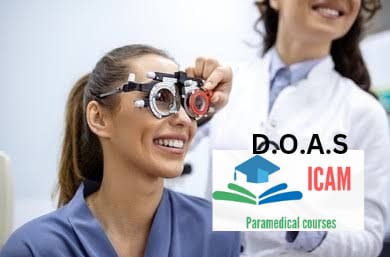Course Content and Syllabus: Optometry Course
Are you interested in a healthcare profession that focuses on eye care and vision? If so, the Optometry course offered by the Indian Council of Alternative Medicine can be an excellent choice for you. This comprehensive program equips students with the knowledge and practical skills required to become skilled optometrists. In this blog post, we’ll explore the course content, top recruiting areas, job positions, specializations, and the immense potential this field offers
.
Course Overview: The Optometry course aims to provide students with a strong foundation in optometric principles, eye care, and vision correction. The curriculum covers various aspects of ocular anatomy, physiology, diagnostic techniques, vision assessment, and management of vision disorders. Students will learn to perform comprehensive eye examinations, prescribe corrective lenses, diagnose and manage common eye conditions, and provide preventive eye care.
Course Duration: The Optometry course typically has a duration of Two years, which includes both theoretical instruction and practical training.
Course Content:
- Ocular Anatomy and Physiology:
- In-depth study of the structure and function of the eye.
- Understanding the visual system and its components.
- Optometric Instrumentation:
- Introduction to optometric instruments and their uses.
- Techniques for measuring visual acuity, refractive errors, and intraocular pressure.
- Ophthalmic Optics:
- Principles of optics and their application in vision correction.
- Understanding the properties of lenses and their effects on light.
- Ocular Diseases and Conditions:
- Common ocular disorders, including cataracts, glaucoma, and retinal diseases.
- Diagnosis and management of eye diseases.
- Contact Lens Fitting and Management:
- Types of contact lenses and their fitting techniques.
- Instruction on proper contact lens care and management.
- Binocular Vision and Vision Therapy:
- Study of binocular vision disorders and their treatment.
- Techniques for vision therapy and rehabilitation.
- Pediatric Optometry:
- Assessment and management of vision problems in children.
- Techniques for pediatric eye examinations and vision correction.
- Low Vision Rehabilitation:
- Evaluation and management of individuals with low vision.
- Strategies for maximizing visual function and independence.
- Geriatric Optometry:
- Optometric care for the elderly population.
- Understanding age-related eye conditions and vision changes.
- Public Health Optometry:
- Community-based eye care and preventive measures.
- Promoting eye health and awareness.
Top Recruiting Areas:
- Hospitals and Eye Clinics
- Optometry Clinics and Vision Care Centers
- Optical Retail Stores
- Research Institutes and Academic Institutions
- Corporate Eye Care Programs
Job Positions:
- Optometrist
- Optometry Consultant
- Vision Care Specialist
- Clinical Optometrist
- Contact Lens Specialist
Specializations:
- Pediatric Optometry
- Low Vision Rehabilitation
- Contact Lens and Cornea
- Ocular Disease Management
- Binocular Vision and Vision Therapy
As you embark on the Optometry course, you’ll acquire the skills and knowledge necessary to provide essential eye care services and improve people’s vision and quality of life. The demand for optometrists is growing, offering numerous career opportunities in various healthcare settings. So, take this exciting journey in the field of optometry and unlock a world of possibilities. Start your path toward becoming an esteemed optometrist today!
